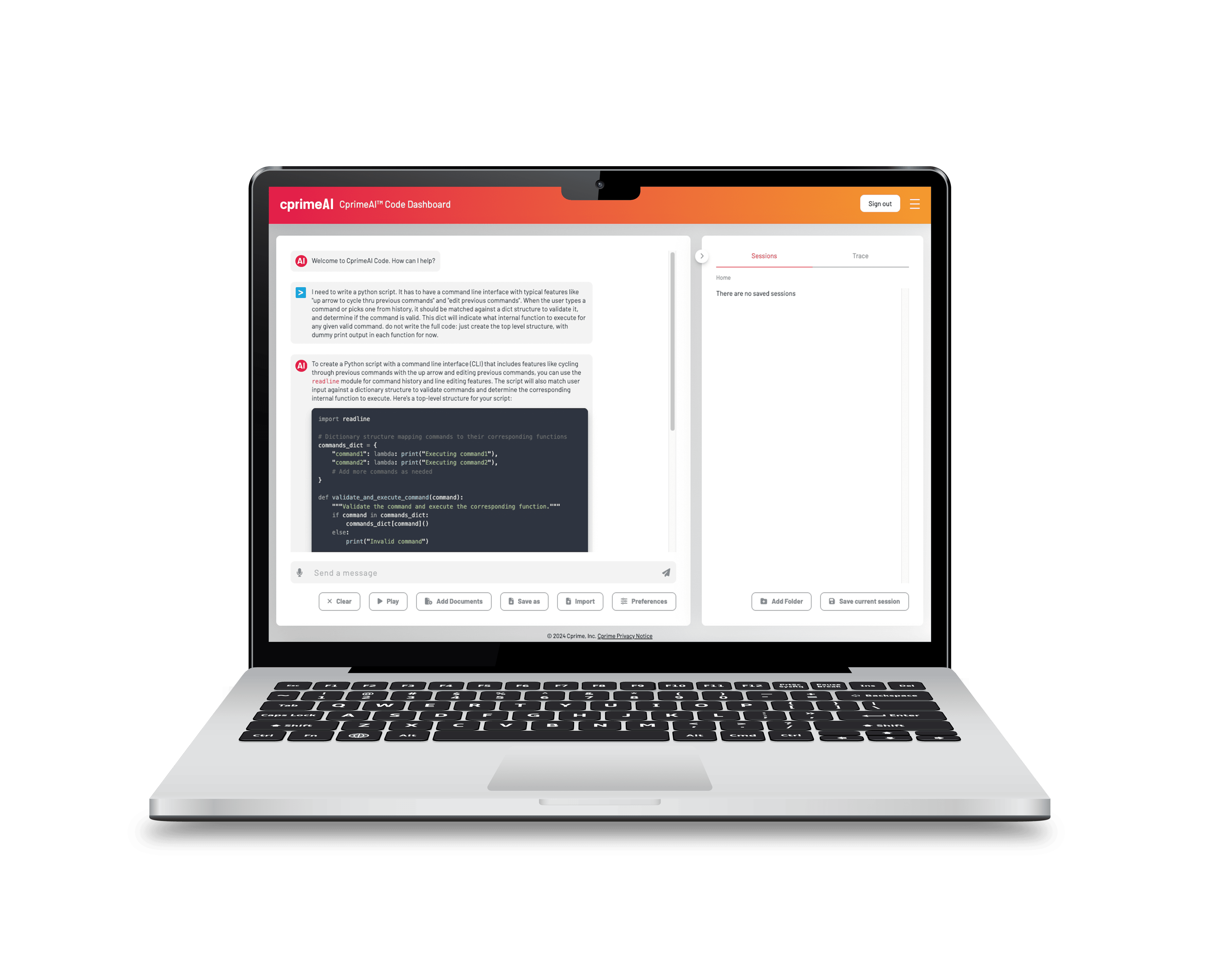AI in Agile: What’s Working and What’s Not?
AI in Agile FAQs addressed in this article:
-
What percentage of organizations are actively exploring or integrating AI tools like LLMs and code assistants into Agile practices? – Nearly 30% of organizations are actively exploring or integrating AI tools such as large language models (LLMs) and code assistants into their Agile practices.
-
Why is there a cautious approach towards AI integration in Agile methodologies? – The cautious approach towards AI integration in Agile methodologies is due to concerns about the maturity of AI technologies, the readiness of teams, and the potential impact on existing Agile workflows.
-
How do Cprime’s AI solutions enhance Agile methodologies? – Cprime’s AI solutions enhance Agile methodologies by automating routine tasks, providing actionable insights for informed decision-making, and ensuring that AI tools complement rather than disrupt established Agile practices.
-
What is the significance of the early stages of exploration in AI and Agile integration? – The early stages of exploration in AI and Agile integration are significant for assessing team and process readiness, identifying areas where AI can add value, and laying a solid foundation for future integration.
-
What challenges are associated with AI integration in Agile practices? – Challenges associated with AI integration in Agile practices include selecting the right AI tools, training teams effectively, and ensuring AI enhances rather than disrupts Agile processes.
-
How can organizations successfully navigate the complexities of AI integration in Agile? – Organizations can successfully navigate the complexities of AI integration in Agile by adopting a strategic alignment of AI technologies with Agile principles, committing to continuous learning and adaptation, and fostering collaboration within the Agile and AI communities.
-
What role does continuous learning play in AI integration within Agile methodologies? – Continuous learning is crucial in AI integration within Agile methodologies as it allows organizations to adapt their strategies and practices in response to new developments and insights in AI technologies.
-
Why is collaboration important in the journey towards AI integration in Agile practices? – Collaboration is important in the journey towards AI integration in Agile practices because sharing experiences, challenges, and successes accelerates learning and innovation, contributing to the development of best practices for successful AI integration.
The fusion of artificial intelligence (AI) with Agile methodologies is becoming increasingly prominent. This convergence promises to redefine the paradigms of efficiency, innovation, and adaptability in the creation and management of software projects.
Drawing insights from the 17th Annual State of Agile Report, this blog post delves into the current trends, attitudes, and practical implications of integrating AI tools within Agile practices.
As we navigate through the findings of this pivotal report, we will also reference Cprime’s AI solutions where relevant, showcasing their alignment with industry trends and their potential to address the emerging needs of Agile teams. However, our primary focus will remain on the survey results and the practical lessons they offer to organizations embarking on this transformative journey.
Join us as we explore the growing interest in AI among Agile practitioners and the strategic considerations for its successful adoption.
The Rising Tide of AI in Agile
The integration of artificial intelligence into Agile methodologies is not just a fleeting trend but a significant shift that is gaining momentum across the software development industry. According to the State of Agile Report, nearly 30% of organizations are either actively exploring the use of large language models (LLMs) and code assistants or have already begun integrating these AI tools into their products and services. This statistic is a testament to the growing recognition of AI’s potential to revolutionize the way Agile teams operate, enhancing both the efficiency and the quality of software development processes.
The allure of AI in Agile practices lies in its ability to automate routine tasks, provide insights through data analysis, and facilitate decision-making processes. For instance, AI-powered code assistants can significantly reduce the time developers spend on coding, allowing them to focus on more complex and creative aspects of software development. Moreover, AI tools can help Agile teams better understand customer needs and preferences by analyzing user data, thereby enabling the development of more user-centric products.
Cprime’s AI solutions are at the forefront of this transformation, offering AI tools and platforms that seamlessly integrate with Agile methodologies. Our expertise in both Agile methodologies and AI technologies positions it as a valuable partner for organizations looking to navigate the complexities of AI adoption with confidence. By leveraging AI, Cprime aims to empower Agile teams to achieve higher productivity, foster innovation, and deliver superior software products that meet the evolving needs of their customers.
However, the journey toward AI integration in Agile practices is not without its challenges. Organizations must navigate the complexities of selecting the right AI tools, training their teams to use these tools effectively, and ensuring that AI enhances rather than disrupts their Agile processes. The survey results from the report highlight the industry’s eagerness to embrace AI, but they also underscore the need for a thoughtful and strategic approach to its adoption.
Current Landscape of AI Adoption in Agile
The journey towards AI integration is unfolding across the software development industry, with organizations at various stages of adoption and exploration. The 17th Annual State of Agile Report sheds light on this evolving landscape, revealing that approximately 22% of organizations are currently experimenting with AI technologies. This indicates a cautious yet optimistic approach towards leveraging AI to enhance Agile practices, suggesting that while there is significant interest, widespread implementation is still in its nascent stages.
This level of experimentation reflects a strategic exploration phase, where companies are assessing the potential benefits and challenges of AI integration. Organizations are keen to understand how AI can streamline workflows, improve decision-making, and ultimately contribute to the delivery of higher-quality software products. However, they are also mindful of the need to ensure that AI tools align with Agile principles and do not disrupt established processes.
Despite the enthusiasm for AI, the survey also highlights a cautious approach among organizations. This dichotomy is evident in the fact that while only 13% of respondents believe no one in their organizations is currently using AI, a significant 8% have been explicitly advised against using AI at this time. The fact that there is no widespread mandate for AI usage at this point underscores the importance of a thoughtful and measured integration strategy. Organizations are aware that to successfully harness the power of AI, they must carefully evaluate which tools best fit their needs, how to train their teams effectively, and how to integrate AI into their existing Agile frameworks.
The current landscape of AI adoption in Agile is characterized by a balance between exploration and caution. As organizations continue to experiment with AI, they are laying the groundwork for more comprehensive integration in the future. This phase is crucial for understanding the practical implications of AI in Agile environments and for developing best practices that can guide successful adoption.
Early Stages of Exploration
AI adoption within Agile methodologies is not just about the immediate integration of new AI tools; it’s also about understanding the broader implications and potential of AI in enhancing Agile practices. According to the State of Agile Report, approximately 17% of respondents are in the initial stages of exploring the role AI could play in their organizations. This indicates a proactive yet cautious approach, where the focus is on comprehending how AI can be seamlessly woven into the fabric of Agile methodologies to bring about transformative changes.
This early stage of exploration is critical for several reasons. Firstly, it allows organizations to assess the readiness of their teams and processes for AI integration. Understanding the capabilities of AI and its alignment with Agile principles is essential for ensuring that the adoption of AI technologies enhances rather than disrupts established workflows.
Secondly, this phase provides an opportunity for organizations to identify specific areas within their Agile practices where AI can deliver the most value, whether it’s through automating repetitive tasks, facilitating data-driven decision-making, or enhancing customer insights.
The early stages of exploration are also a time for learning and adaptation. As organizations delve into the potential of AI, they must be prepared to adapt their strategies based on their findings. This may involve re-evaluating their approach to AI integration, investing in training for their teams, or even redefining their Agile practices to better accommodate AI technologies.
The Path Forward
As we navigate through the insights provided by the 17th Annual State of Agile Report, it becomes evident that the integration of artificial intelligence into Agile methodologies is not just a trend but a strategic evolution in software development. The path forward for organizations looking to harness the potential of AI within Agile practices is marked by both opportunities and challenges. To successfully navigate this journey, a thoughtful, balanced approach is essential.
Cprime’s AI solutions play a pivotal role in this journey, providing the tools and expertise necessary to integrate AI into Agile methodologies effectively. A prime example (no pun intended) is the newly launched CodeBoost™ coding assistant solution, powered by CprimeAI. It not only leverages best in class AI technologies, but updates each aspect of the development process to optimize for these AI tools, and couples them with a fast-moving, comprehensive rollout that includes training, coaching, and support for efficient and effective adoption, driving tangible business outcomes.
Cprime’s focus on aligning AI technologies with Agile frameworks ensures that organizations can navigate the complexities of AI integration with confidence, making the most of the opportunities AI presents.
To delve deeper into the possibilities of AI in Agile and to explore how Cprime’s Generative AI services can help your organization transition from discovery to mastery in AI integration, we invite you to read our comprehensive blog post: Cprime’s Generative AI Services: From Discovery to Mastery in AI Integration. Discover how to leverage AI to elevate your Agile practices and drive unparalleled growth and innovation in your software development processes.



